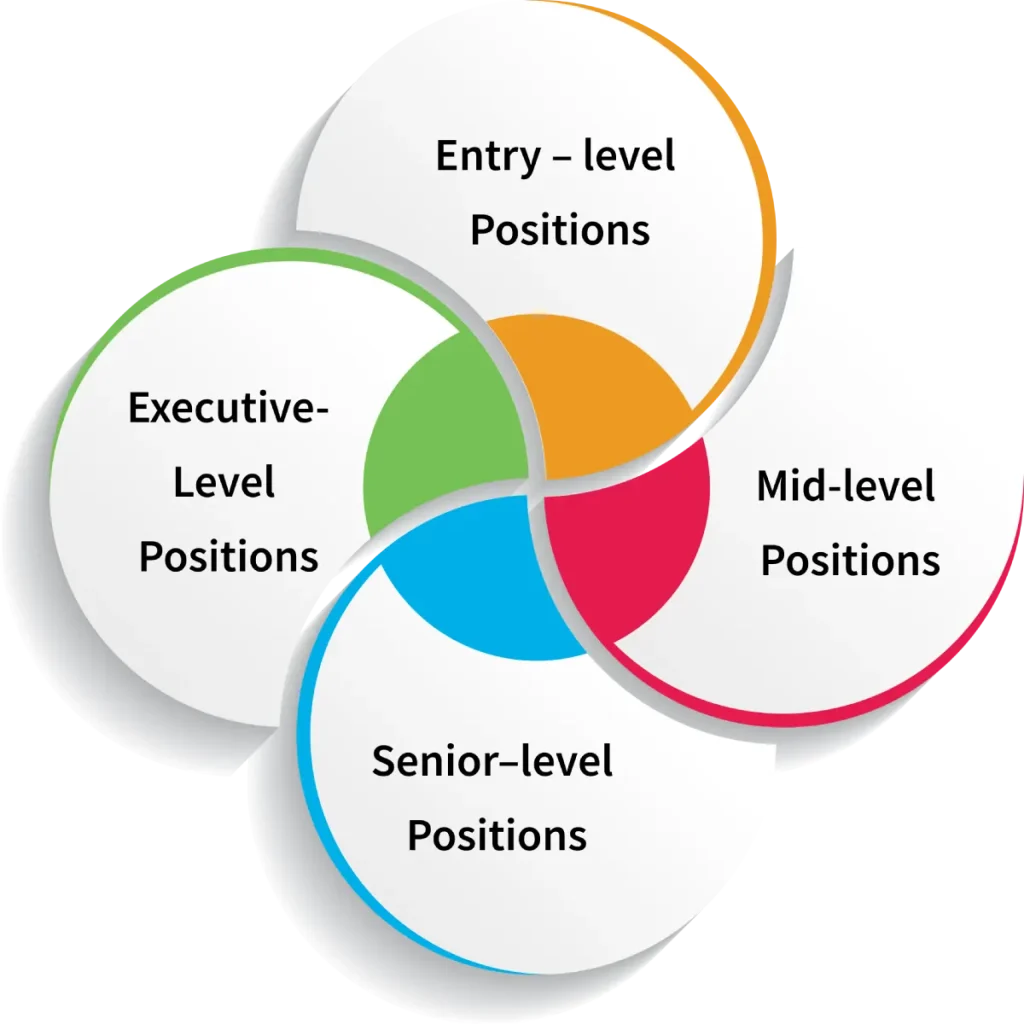What is a Job Title?
A job title is a name given to a particular position or post that an individual holds in an organization. It reflects the job’s responsibilities, level and the field in which the person works. A job title shows the difference between roles, explains what to expect, and helps with finding and growing in a job. For instance, job titles are “Software Engineer” and “Marketing Manager”, etc.
The Chief Executive Officer (CEO) is a top organizational position and supervises every other position in the company. Corporate job titles are important because they show what a person is good at and what skills they have. They also influence a person’s career growth, salary discussions, and skill development. It is important to choose the right job title when beginning a new job to help with future career growth.
Why is it Important to have Job Titles?
Job titles play an important role in a company. First, they let everyone understand what is expected from them, preventing duplicate work. In addition, job titles show who’s in charge and who reports to whom, and for keeping things organized.
Moreover, employees place great importance on business titles. They give a clear idea of an individual’s job and where their career is going. Being part of a good team and having a good career title makes people proud and want to work more. A good company role serves as recognition of their contributions. A clear job title can change the pay, promotions, and job chances, which helps to grow in career.
What are the Job Positions in a Company: Job Title Hierarchy
Job title structure helps to determine the rank of the titles in a given company to enable one to know who has more authority, responsibilities and prestige. While the job titles and hierarchy can vary depending on the organization’s size, industry, and structure, a common job title hierarchy might include the following levels:

Entry – Level Positions
Such titles are usually held by workers who are either new in the organization or industry and have little power or experience. Examples include:
- Intern
- Assistant
- Trainee
Mid-Level Positions
These titles represent roles with more experience, responsibility, and sometimes specialized skills. Most of them are associated with supervisory or managerial responsibilities.
- Specialist
- Coordinator
- Supervisor
Senior–Level Positions
These titles refer to the posts that have major experience, knowledge, and managerial positions. They may involve managing departments, strategic planning, and decision-making. Examples include:
- Vice President
- Senior Manager
- Director
Executive-Level Positions
These titles are at the highest level of organizational leadership, responsible for setting overall strategy, guiding company direction, and representing the organization externally. Examples include:
- Chief Executive Officer (CEO)
- Chief Financial Officer (CFO)
- Chief Operating Officer (COO)
In some companies, there are extra career title levels to show different roles, departments, or skills. These titles help explain what each person does and can also guide career growth and promotion.
Different Job Titles in a Company
Organizations use job titles to describe the nature of jobs and to create a structure of authority in the workplace. They help create an organized structure, making it easier for employees to understand their responsibilities and communicate effectively with each other.
Job titles are important for employees because they show how their career is improving. For instance, anyone who enters a company with the first job of Sales Associate can move to a list of positions such as Sales Supervisor, Sales Manager, or even Regional Sales Director.
Corporate job titles can change depending on the company, but they help explain what each person’s job is.
Here’s an overview of job titles across several professions.
Business Job Titles
A business job title defines an employee’s role and responsibilities, such as Office Admin or Receptionist, and helps establish hierarchy and communication. It sets up a structure and makes communication flow better in the company.
- CEO (Chief Executive Officer)
- CFO (Chief Financial Officer)
- CMO (Chief Marketing Officer)
- COO (Chief Operating Officer)
- HR Manager
- Sales Manager
- Marketing Specialist
- Financial Analyst
- Operations Coordinator
- Business Development Manager
- IT Support Specialist
- Administrative Assistant
- Accountant
- Customer Service Representative
Marketing Job Titles
A marketing job title means a position that involves selling products or services, market research, and the promotion of products through the Internet, social networks, and commercials.
- Marketing Manager
- Social Media Specialist
- Content Writer
- Brand Strategist
- Digital Marketing Analyst
- SEO Specialist
- Marketing Coordinator
- Event Marketing Coordinator
- Email Marketing Specialist
- Public Relations Manager
- Media Planner
- Marketing Data Analyst
- Campaign Manager
- E-commerce Marketing Manager
- Graphic Designer
- Product Marketing Manager
- Advertising Manager
- Brand Manager
- Marketing Automation Specialist
- Web Analytics Specialist
Sales Job Titles
A sales job title refers to roles focused on selling products or services, building client relationships, negotiating deals, and meeting revenue goals. Specializations include inside sales, outside sales, account management, and business development.
- Sales Representative
- Account Executive
- Sales Manager
- Business Development Manager
- Sales Associate
- Inside Sales Representative
- Outside Sales Representative
- Account Manager
- Sales Consultant
- Territory Sales Manager
- Key Account Manager
- Sales Development Representative (SDR)
- Sales Coordinator
- Sales Engineer
- Customer Success Manager
- Channel Sales Manager
- Regional Sales Manager
IT Job Titles
An IT job title means a job position within the IT department of an organization. IT professionals manage, develop, and maintain technology systems, software, and infrastructure.
- IT Manager
- Software Engineer
- Network Administrator
- Systems Administrator
- Database Administrator (DBA)
- Web Developer
- IT Support Specialist
- Systems Analyst
- IT Security Analyst
- DevOps Engineer
- IT Help Desk Technician
- QA Engineer (Quality Assurance)
- Front-end Developer
- Back-end Developer
- Mobile App Developer
- UX/UI Designer
- Network Engineer
- IT Business Analyst
- IT Consultant
- Cybersecurity Specialist
- Data Scientist
- Business Intelligence Analyst
- IT Project Manager
- IT Operations Manager
- Cloud Solutions Architect
Supervisor Job Titles
A supervisor job title refers to a role where individuals manage and guide a team or department within an organization. They help their team stay productive, handle issues, and organize work in order to achieve company objectives.
- Supervisor
- Shift Supervisor
- Production Supervisor
- Operations Supervisor
- Team Leader
- Warehouse Supervisor
- Retail Supervisor
- Customer Service Supervisor
- Restaurant Supervisor
- Maintenance Supervisor
- Cleaning Supervisor
- Housekeeping Supervisor
- Front Desk Supervisor
- Security Supervisor
- Call Center Supervisor
- Sales Supervisor
- Quality Control Supervisor
- Manufacturing Supervisor
- Field Supervisor
- Construction Supervisor
Human Resources Job Titles
A human resource job title refers to roles in an organization’s HR department. They are responsible for tasks like hiring employees, managing employee relations, organizing training and development, handling pay and benefits, and ensuring compliance with labor laws.
- Human Resources Manager
- HR Generalist
- Talent Acquisition Specialist
- Compensation and Benefits Analyst
- Employee Relations Coordinator
- Training and Development Specialist
- HRIS (Human Resources Information Systems) Administrator
- Diversity and Inclusion Coordinator
- HR Business Partner
- Recruitment Coordinator
- HR Coordinator
- HR Analyst
- HR Recruiter
- Benefits Administrator
- Labor Relations Specialist
- Talent Management Specialist
- Employee Engagement Manager
- HR Compliance Officer
- HR Operations Manager
- Organizational Development Consultant
Accounting Job Titles
An accounting job title is a position within an organization’s finance department that involves maintaining financial records, statement preparation, data analysis and maintaining compliance with accounting principles. They manage budgeting, forecasting, auditing, taxes, and financial reporting that helps an organization’s financial situation and its decisions.
- Chief Financial Officer (CFO)
- Certified Public Accountant (CPA)
- Financial Analyst
- Tax Accountant
- Accounts Payable Specialist
- Accounts Receivable Clerk
- Budget Analyst
- Payroll Administrator
- Financial Controller
- Internal Auditor
- Bookkeeper
- Billing Specialist
- Cost Accountant
- Senior Accountant
- Treasury Analyst
- Financial Planner
- Investment Analyst
- Financial Reporting Manager
- Forensic Accountant
- Compliance Officer
Operations Job Titles
An operations job title refers to roles responsible for managing and improving the daily functions of a business. These roles focus on enhancing efficiency, productivity, and processes across areas like supply chain management, logistics, production, inventory control, and quality assurance.
- Operations Manager
- Supply Chain Analyst
- Logistics Coordinator
- Process Improvement Specialist
- Inventory Control Manager
- Warehouse Supervisor
- Production Planner
- Purchasing Agent
- Operations Analyst
- Business Process Analyst
- Operations Support Specialist
- Inventory Analyst
- Procurement Specialist
- Vendor Management Specialist
- Operations Coordinator
- Quality Control Manager
- Distribution Center Manager
- Supply Chain Manager
- Facilities Manager
- Operations Director
Cybersecurity Job Titles
Cybersecurity titles pertain to roles responsible for protecting an organization’s information systems and data from cyber threats. These roles include implementing security measures, responding to cybersecurity breaches, and making sure cybersecurity rules are followed.
- Information Security Analyst
- Cybersecurity Engineer
- Network Security Administrator
- Chief Information Security Officer (CISO)
- Security Operations Center (SOC) Analyst
- Ethical Hacker (Penetration Tester)
- Security Consultant
- Incident Response Specialist
- Cybersecurity Architect
- IT Security Manager
- Malware Analyst
- Data Security Analyst
- Application Security Analyst
- Security Compliance Analyst
- Cybersecurity Risk Analyst
- Identity and Access Management (IAM) Specialist
- Network Security Engineer
- Cloud Security Engineer
- Cybersecurity Forensics Investigator
- Cybersecurity Operations Manager
Management Job Titles
A management job title is a position assigned to someone who leads and manages teams or departments within an organization. Some activities may include planning, organizing, coordinating, and supervising activities enabling an organization to achieve its objectives.
- General Manager
- Operations Manager
- Sales Manager
- Marketing Manager
- Project Manager
- Human Resources Manager
- Finance Manager
- Customer Service Manager
- IT Manager
- Account Manager
- Business Development Manager
- Product Manager
- Quality Assurance Manager
- Supply Chain Manager
- Restaurant Manager
- Retail Store Manager
- Plant Manager
- Program Manager
- Administration Manager
- Operations Director
Engineering Job Titles
An engineering job title is a designation for individuals with certain specialized knowledge in various fields of engineering. These titles represent roles responsible for designing, developing, and implementing engineering solutions by applying scientific principles and technical skills.
- Software Engineer
- Mechanical Engineer
- Electrical Engineer
- Civil Engineer
- Aerospace Engineer
- Chemical Engineer
- Biomedical Engineer
- Environmental Engineer
- Industrial Engineer
- Systems Engineer
- Quality Assurance Engineer
- Process Engineer
- Materials Engineer
- Network Engineer
- Control Systems Engineer
- Computer Hardware Engineer
- Power Engineer
- Robotics Engineer
- Audio Engineer
- Structural Engineer
Finance Job Titles
Finance job titles are roles in the finance industry that involve tasks such as financial analysis, investment management, budgeting, and financial planning to achieve financial goals and objectives.
- Financial Analyst
- Investment Banking Analyst
- Finance Manager
- Financial Controller
- Risk Analyst
- Portfolio Manager
- Financial Advisor
- Credit Analyst
- Investment Analyst
- Actuary
- Budget Analyst
- Treasury Analyst
- Real Estate Analyst
- Tax Consultant
- Corporate Finance Associate
- Mergers and Acquisitions Analyst
- Insurance Underwriter
- Asset Management Specialist
- Commercial Banker
- Hedge Fund Analyst
Frequently Asked Questions
Yes, higher job titles usually come with higher salaries and more career growth opportunities, reflecting increased responsibility and expertise.
Job titles are important for attracting candidates. A clear, specific title can make a job more visible, while a vague one may turn people away. Companies now create titles that better match the role and attract the right candidates.
Titles for employees in remote or freelance job positions are more generalized and usually depict a role or a work type, such as ‘Freelance Writer,’ or ‘Remote Project Manager.’ This gives workers more freedom to create titles that match their work style.
For someone who does many different tasks, job titles are usually general and don’t focus on just one skill. Here are a few examples of such titles:
Generalist
Jack of All Trades
Multi-skilled Professional
Assistant
General Laborer
Service Specialist
Administrator
Coordinator




